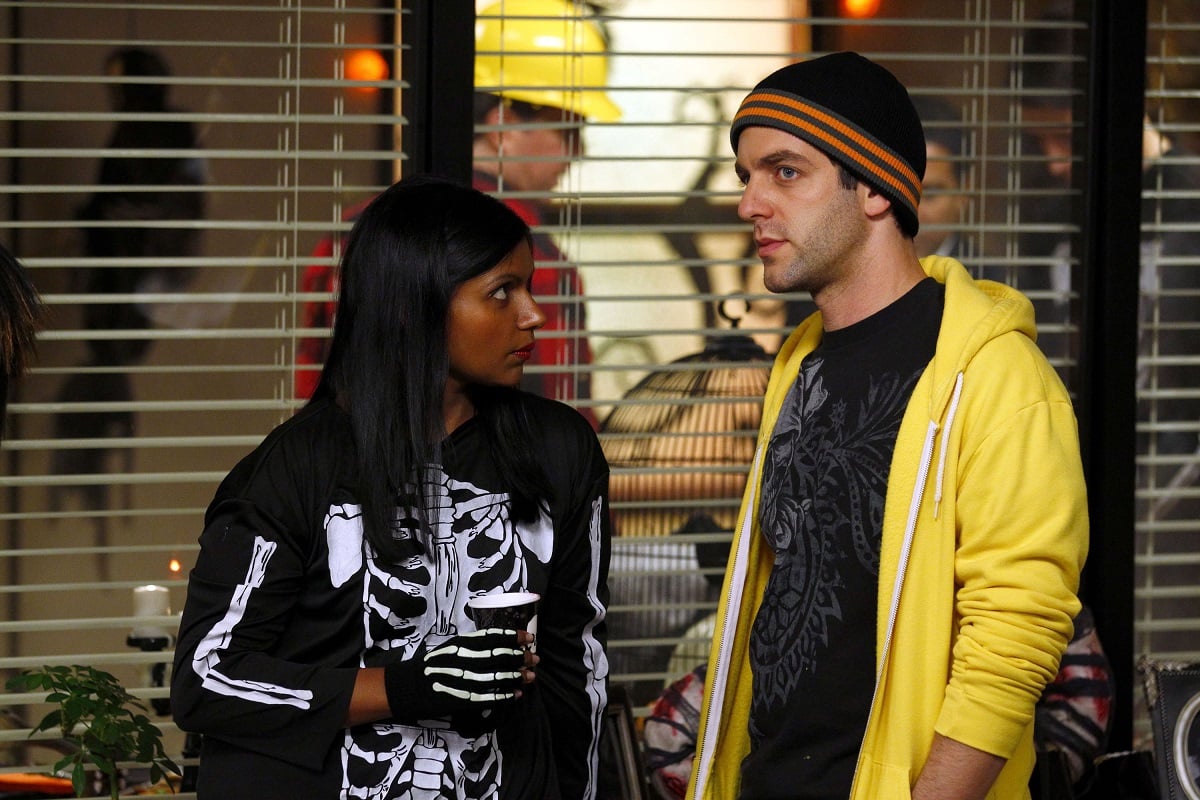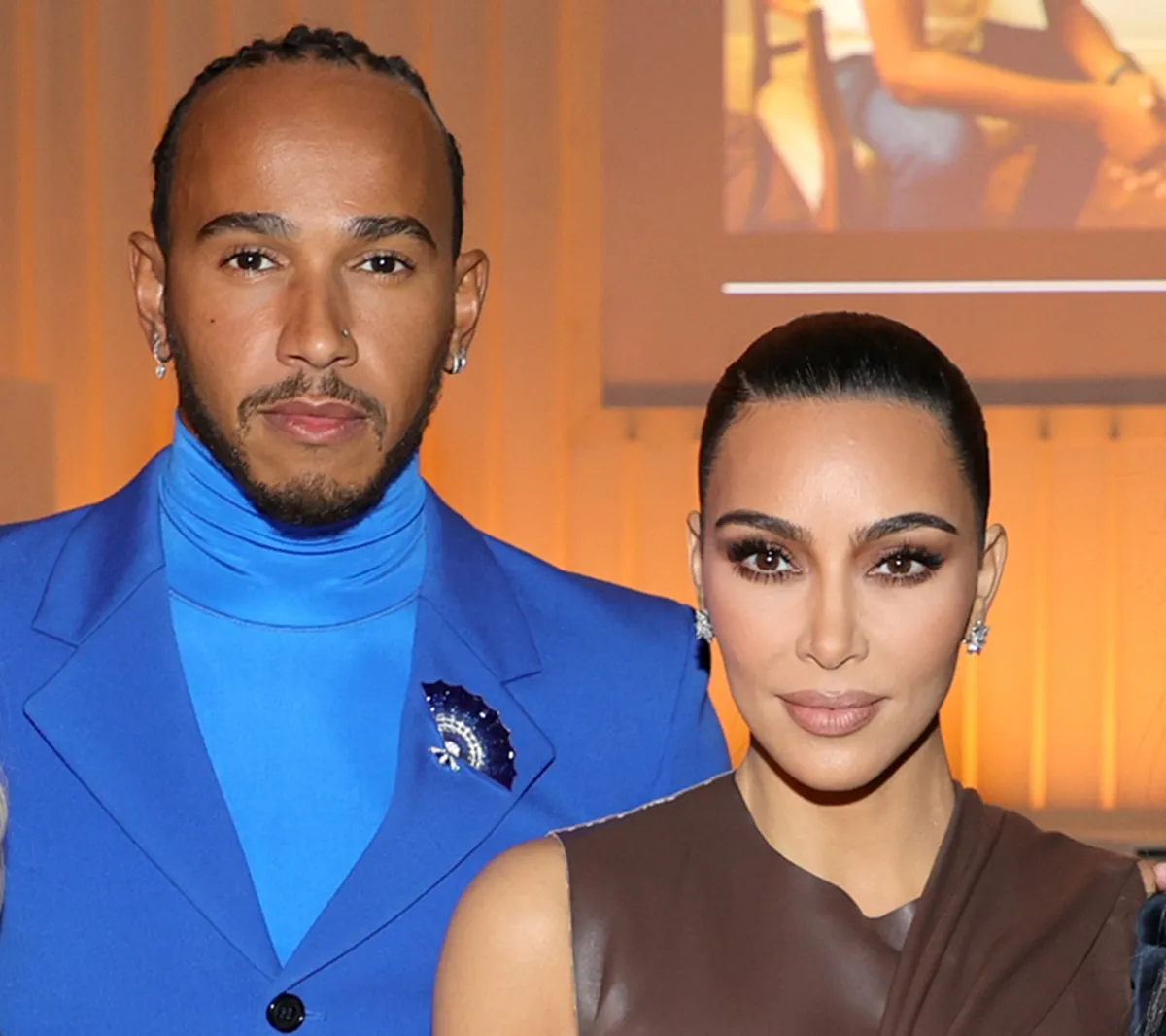‘The Office’: B.J. Novak Pushed Mindy Kaling to Consider Her Religion and Culture More Carefully
The unique, unconventional relationship between B.J. Novak and Mindy Kaling has fascinated, delighted, and even frustrated their fans ever since the two performers served as writers, executive producers, and actors on nine seasons of NBC’s The Office. Their memorable turn as Ryan Howard and Kelly Kapoor on the beloved show wasn’t completely unlike their real-life on-again, off-again relationship.
Now, Novak and Kaling are still deeply close – with Novak even serving as godfather to Kaling’s two children, Katherine (Kit) and newborn Spencer. And in Kind of Hindu, an Amazon Original Story released as part of Kaling’s most recent collection of essays, Nothing Like I Imagined, on October 6, Kaling reveals that it was partly Novak’s influence that led her to think more deeply about the role of her Indian heritage and Hindu religion in her children’s lives.

The birth of Kaling’s child made her think more about her faith
In Nothing Like I Imagined, Kaling reflects on her relationship to her Indian identity, as well as her practice of Hindusim. Describing herself as “kind of Hindu,” the 41-year-old mom of two writes that she was never a deeply religious person.
When Kaling was growing up, she explains, she and her family attended “pujas (Indian religious gatherings/ceremonies once or twice a year.”
“For my family, a puja was an opportunity to dress up in our colorful Indian clothes we never got to wear and see the larger Indian community we loved gossiping about,” the star of The Mindy Project writes.
But giving birth to her daughter, Kit, “changed everything” for Kaling. She immediately wondered how she could help her daughter feel more invested in her cultural identity, community, and faith practice.
“I felt I needed to think about my culture in a larger way, since now, technically, it was our culture,” Kaling writes.
Novak’s position as Katherine’s godfather led to a conversation about religion and identity
It was Novak – Kaling’s ex-boyfriend, longtime friend and collaborator, and The Office co-star – who helped Kaling get the ball rolling more in terms of how she wanted Kit’s future to unfold in terms of religion and cultural practice.
“It wasn’t until her godfather, television and film’s B.J. Novak, asked me about what a godfather was actually supposed to do that I thought about offloading the religious questions onto somebody else,” Kaling reveals.
When she selected Novak as her daughter’s godfather, Kaling did so simply because it seemed like a nice, “wholesome” thing to do. But when she did further research, Kaling discovered that a godparent was meant to “help continue your child’s Christian faith in case you die.”
“B.J. is Jewish, and I am Hindu, so the whole thing made no sense at all,” Kaling jokes in her essay.
Kaling began to wonder what role Hinduism would play in her daughter’s life
As has been the case throughout their relationship, Novak and Kaling challenged each other to think more deeply and critically in this area, too. Novak wanted to know what Kaling would expect in terms of Kit’s religious identity.
“B.J. asked a great question: What would godparenting responsibilities mean in terms of Kit’s Hinduism?” Kaling reveals.
After all, when she “inevitably” became a godparent to Novak’s child, “it would definitely be [her] responsibility to teach that kid some Judaism” – because Novak was, as Kaling put it, “more than Kind of Jewish.”
When the two The Office alums began to discuss Kaling’s relationship to, and understanding of, her background, one thing became clear to Novak: Kaling wasn’t quite sure how to proceed in this area, especially as a parent.
“B.J. agreed nonjudgmentally as I explained this to him,” Kaling writes of her dilemma, “before observing, ‘So you don’t really know what you’re talking about.’” The new mom surprisingly agreed with Novak’s assessment.
She came to a greater understanding of the role of faith in her life through her daughter’s Mundan
Ultimately, after some reflection on the questions Novak posed, Kaling decided to have a Mundan ceremony for her daughter Katherine – which she describes as a Hindu ceremony which involves shaving off a baby’s hair when they are between four months and three years old.
“It’s done to rid you of the negativity from your past life, which is represented by the hair you were born with, so it’s very much mandatory,” Kaling writes, adding that she herself had a Mundan in South India as a baby.
The ceremony took place in Kaling’s formal living room, where she seated little Kit on a tapestry on the floor. Kit didn’t exactly take well to having her head shaved off, but that was over soon enough. Next, the participants offered flowers, sweets, and fruit to statues of Gods, and important people in Kit’s life blessed her with incense and holy water. Afterward, they had a larger party with non-Hindu friends to celebrate the occasion.
Katherine’s ceremony left Kaling “surprisingly overwhelmed.” Initiating her daughter into her faith led her to feel more connected to others, but it also reminded her that her grandmother and mother wouldn’t be there to help her raise her little one.
“I realized the one thing that would bridge all three of our lives was our faith,” Kaling explains in Nothing Like I Imagined. “[It was] this intangible thing that had been passed on to me and that I would now pass on to my daughter.”
While the former star of The Office didn’t believe she would ever be much more religious on a personal level, she realized how important it was for her to help her daughter feel more connected to her roots.
“As long as Kit and I are Kind of Hindu, we will never be alone,” Kaling concludes poignantly, adding that she will now strive to make it a priority to help her daughter feel integrated into a larger community of those who have come before her and those who will come after her.


